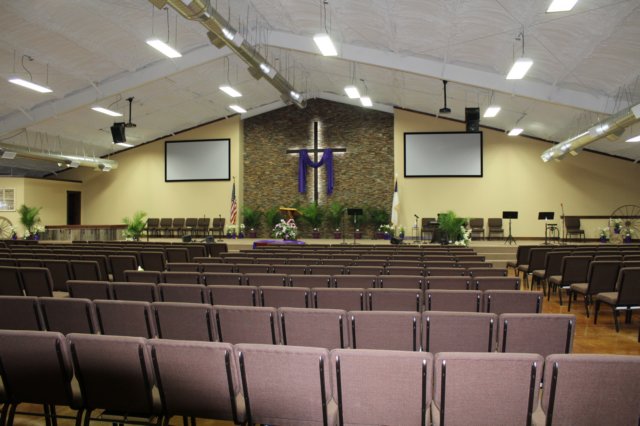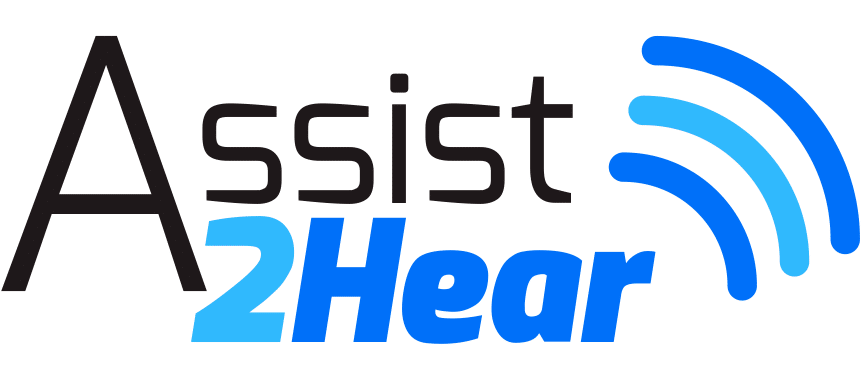
Jan 22, 2018 | Learning Center, News
Maxdale Cowboy Church – Install Announcement
Assist2Hear is pleased to announce the completion of another Texas induction hearing loop system at Maxdale Cowboy Church, located 16816 Wolfridge Road, Killeen, Texas. With the installation of the hearing loop, Maxdale parishioners with hearing loss can enjoy sermons in the church, minus any echo or reverberation that might have previously made it difficult to hear due to the church’s concrete floors and high ceilings.
A hearing loop is a special type of sound system which helps parishioners suffering with hearing loss. Most churches offer headsets via an FM system, which many people with hearing aids are unable to use or simply are too embarrassed to use.
A hearing loop also known as an induction loop, consists of copper wire typically installed under the flooring or in the ceiling by our field certified installation team. The hearing loop is then connected to the church’s sound system to create a magnetic signal which is picked up by the copper telecoil, located inside of most hearing aids and hearing implants. The system requires no additional attachments or headsets- the user simply walks into the church and changes a setting on their hearing device and the loop delivers custom sound to the hearing aids! This amazing technology eliminates the need for headsets which often go unused in churches for a multitude of reasons.
Feeadback!
Since the completion of the hearing loop installation, feedback from Killeen residents that attend the church has been positive!
The Maxdale Cowboy Church is truly committed to meeting the needs of their congregation
said Andy Rivas, Project Manager for Assist2Hear of Dallas and Austin.
Interested in learning more?
If you are interested learning more about hearing loop technology such as “What is a hearing loop?” or “How does an induction loop work?”, checkout the many resources on our website, www.Assist2Hear.com. If you are interested in learning more about installing an induction loop in your Texas church or venue, Assist2Hear’s Texas team is here to help! Please call us today at 877-338-1084 to discuss or schedule a free on-site assessment.

Jan 19, 2018 | Learning Center, News
Source: http://www.news9.com/story/37587589/okcs-civic-center-music-hall-adds-hearind-loop
The OKC Civic Center Music Hall. The hearing loop system is hard wired into the auditorium and will transmit sound directly into a hearing aid or Cochlear implant with a “T” coil. When you visit the Civic Center for a musical show or concert this fall, you may be surprised by what you hear!
Oklahoma Cityans will hear better! The first hearing loop installed in the metro is located in the newly renovated Nichols Hills City Council chambers where the users of hearing devices will be able to hear all that goes on in meetings and conferences. A ribbon cutting ceremony with many ‘dignitaries’ and guests celebrated the completion of the installation.
The second LOOP installation in Oklahoma City has also just been completed in the OKC Civic Center Music Hall. The hearing loop system is hard wired into the auditorium and will transmit sound directly into a hearing aid or Cochlear implant with a “T” coil. When you visit the Civic Center for a musical show or concert this fall, you may be surprised by what you hear!
Central Oklahoma Chapter of the Hearing Loss Association of America is proud to be a part of the “Oklahoma City Hearing Loop Initiative.” Our member, Ana Covey and her company, Assist2Hear are responsible for these installations. COCHLAA, with Ana and Assist2Hear and are looking forward to many more installed locations to help those suffering with hearing loss. After all, it is an ADA requirement, that facilities offering public access where sound is integral to the space, must offer hearing assistance to those who need it and the hearing loop is by far, the user-preferred system.
Please visit with your audiologist or hearing aid specialist to make sure your hearing aid or Cochlear device is hearing loop ready by activating the telecoil (T-coil) option available in most aids.
If you know of businesses that have this kind of need, please feel free to contact COCHLAA at the Hearing Helpers Room, 405-717-9820 or visit our website, www.okchearingloss.org . You can also contact Ana at ana@Assist2Hear.com or (405)640-5152 for any questions about hearing loops.
Join the Hearing Loss Association and help us get our city “get in the loop.” Hearing Loss Association of America Central Oklahoma Chapter holds meetings twice a month. Second Mondays, 6:30-8PM and the third Thursdays, 1:30-3PM at Lakeside Methodist Church, 2925 NW 66th St. The meetings are open to the public, no admission charge.
This is an article by Ron Hendricks on Senior News & Living OK
Jan 19, 2018 | Learning Center, Research

One of the most common reactions people have when they develop hearing loss is D-E-N-I-A-L! But denying hearing loss has an impact on others as well as your own well-being.
Make a Resolution for Better Hearing in 2018!
The new year is here and Assist2Hear encourages you to make a resolution for better hearing health. Many of us know that hearing loss affects senior citizens, but it also affects every other age group including teenagers at an alarming level.
Typical signs of hearing loss
One of the most common reactions people have when they develop hearing loss is D-E-N-I-A-L! But denying hearing loss has an impact on others as well as your own well-being. If you recognize these typical signs of hearing loss in yourself or your loved ones, a simple hearing screening might be your answer to hearing better.
- Buzzing/Ringing in ears
- Muffled Hearing
- Failure to respond
- Squinting to Understand
- Head tilting/turning to hear better
- Listening to music/tv at high volume
- Difficulty following conversations/ Lip Reading
- Depression/Withdrawal
If your audiologist suggests hearing aids are in your future- Do not delay! Many people struggle with hearing loss an average of 5-7 years before finally buying hearing aids. Would you spend years with blurry vision instead of buying glasses? The dangers of postponing hearing aids are numerous.
So, consider a few reasons not to delay getting hearing aids:
Reason #1: Did you know that the longer you wait to get hearing aids, the harder it is for your brain to adjust to hearing certain sounds again? Much like glasses and bifocals, the brain must adjust to sound via hearing aids that may not have been heard in some time, such as birds chirping, appliances running, and everyday sounds that may have been unheard in recent years. This can be very frustrating to many new hearing aid wearers and takes time to adjust.
Reason #2: Hearing is a very important sense that contributes to our well-being. Not being able to hear results in many people isolating themselves from family and social interaction, which in turn affects their mental and physical health, as well as safety. Hearing loss can lead to depression, anxiety, confusion and withdrawal in all age groups including teenagers.
Reason #3: While hearing aids are not perfect and do not “cure” hearing loss any more than glasses cure vision loss, they do improve hearing in many settings and open the door to add assistive listening devices to help the hearing aids hear better in other situations like induction hearing loops. A manual t-coil setting in the hearing aid allows the wearer to enjoy sound in hearing loops.
So, what are you waiting for? A hearing assessment is typically free at most audiology offices. Hearing aids can be basic or state of the art, depending on your budget and level of hearing loss. It takes some persistence on your part to make the hearing aids comfortable to wear and get them adjusted correctly. So be patient and work with your audiologist to get it right! You will be glad you did and so will your family and friends!

Jan 16, 2018 | Learning Center
Did you know that you can loop your TV room with the Assist2Hear Home Loop System for the best experience available to the hard of hearing. Your spouse and neighbors will be happy that the volume is not turned up full blast! And you will be ecstatic at how well you can hear the TV without having to wear a headset. The only thing necessary is the residential home loop system, available from Assist2Hear for less than $300 and your own t-coil equipped hearing aids!
Just imagine, turning on the TV and flipping the T-coil switch or program on your hearing aid, then sitting back to enjoy the program. My own father told everyone he knows about his new home hearing loop and I have seen so many ear to ear smiles from the many loop users.
How do you loop your TV room? The Assist2Hear Home Loop System is quite easy for and designed for self-installation. The residential home loop system comes with 100’ of loop wire which can be run around the perimeter of the TV room, either under the carpet or pushed under the baseboard. Where the wire must cross a doorway, just use a coat hanger or something stiff to feed the wire under the carpet. If the floors are hardwood, you can put the wire on the baseboard or if there is a crawl space or unfinished basement below, just tack the wire underneath since the signal travels up and down. The wire could be put in the ceiling, but this is more difficult with insulation.
With the wire run around the room (less than 100’ perimeter), just put the wire ends in the back of the amplifier, like hooking up speakers. Then use the supplied RCA plugs to connect your TV through the Audio Out jacks and plug the other end into the back of the loop amplifier. NOTE: Many of the newer TVs do not have RCA Audio Out jacks but have Digital Audio Out. In this case, you will need a Digital to Analog Converter readily available online for about $25 or less.
The sound through the hearing loop is nothing short of amazing, according to most users. The sound is transmitted directly from the TV to the user’s own hearing aid that has been programmed for their hearing loss. There are no headsets or neckloops to wear. Just flip the switch to turn on the t-coil program in the hearing aid and enjoy.
For more information about residential and home loop systems, visit www.assist2hear.com.
Aug 7, 2017 | Learning Center, News

Denial about Hearing Loss is very common!
Are you struggling to hear clearly? Do you find yourself asking people to repeat themselves because you believe they are mumbling? Is it difficult to hear in a restaurant or riding in a car? Are you struggling to hear the sermon at church or a speaker during a presentation? Many of us are missing out on important parts of a conversation, constantly trying to fill in the blanks. Are you in denial about hearing loss?
Many of us are in a state of denial about our hearing loss and it is very common. Most hearing loss is very gradual so it can go unnoticed for a long time. We miss the clues and deny the facts. We can’t see or feel hearing loss. Yet, hearing is one of our most important senses. It keeps us connected socially – or not. It is important to our employment, yet we are afraid to say anything for fear of retribution or loss of a job. It is important to our safety and well-being to hear sirens, horns or impending danger.
When did eye glasses become ok but not hearing aids? We’ll spend several thousand dollars to have our eyes fixed with a laser, but we are reluctant to spend the same to improve our hearing. The bad part about denial of your hearing loss is that your brain actually forgets the sounds you used to hear and now do not. The longer this goes on, the harder it is for the brain to relearn these sounds when you are finally fit with a hearing aid. Relate this to your brain adjusting to new bi-focals or tri-focals in your glasses or contacts. It can be unnerving and actually painful when sounds are brought back into your life until the brain adjusts. Some people quit using their hearing aids for this reason! Sure, hearing aids are not perfect and do not “cure” hearing loss any more than glasses cure vision loss, but they are a step toward maintaining quality of life.
With the Baby Boomers making up about 1/3 of the hard of hearing population in the US, hearing loss is becoming more common in conversation. Access for the hard of hearing in many private and public venues is becoming an issue. New revised ADA standards effective 3/15/12 clearly mandate that all public venues of any size with a sound system must provide assistive listening devices. Hearing loops are the favored system by many and loops are becoming more common in the US. Grass roots initiatives are gaining ground in many states including Colorado, Oklahoma, Kansas, Texas, Michigan, Wisconsin, New York, Florida, New Mexico and Arizona.
Advocacy for hearing access is on the rise after being shoved under the carpet for many years. We at Assist2Hear are trying to do our part in promoting access for the hard of hearing and educating the public and hearing professionals about what is available to help the hard of hearing, most notably induction hearing loops.
Are you ready to acknowledge your hearing loss and do something about it? Please visit your local audiologist for a hearing screening and make sure to bring a friend or family member to check theirs as well!
Aug 7, 2017 | Learning Center, News

Caring for your hearing aid is a must! Take care of your investment with these simple tips.
Caring for your hearing aid is essential. Like your car or your home, your hearing aid is an investment and a vital one at that. If you want to make your hearing aid last longer, consider these tips:
1. Did you know that moisture is the # 1 cause for hearing aid failure? Clean and disinfect your hearing aids regularly, but not with water. Spray your hearing aid with a disinfectant/deodorizer that is made especially for hearing aids (including ear molds), then wipe them down with a soft, dry cloth. You can also use hearing aid cleaning wipes, which are pre-moistened. In addition to products that you can use at home, you can also purchase travel-size (2 oz. or 4 oz) bottles of hearing aid spray cleaner or travel-size maintenance kits with battery testers.
2. Remove any ear wax in and around the plastic tubing with a hearing aid brush. Wax can block the receiver or microphone and reduce sound, cause feedback or create a whistling effect. Although many hearing aid kits come with a wire pick, be careful when using them as they can force the wax deeper into the channel.
3. Open the battery door when storing your hearing aid to let the air enter. This will reduce the effects of moisture and helps prolong battery life. Better yet, use a hearing aid dryer. Some hearing aid dryers use gentle heat to remove moisture and condensation. Some use UV light instead of chemicals, to inhibit bacteria growth. Others, like the Ever-Dry Hearing Aid Dryer, use highly absorbent silica gel beads to pull the moisture from the hearing aid and any wax. They’re simple to use and the compartment is easy to open (even for those with arthritis). Most, like the Serene Innovations Hearing Aid Dryer, will hold two pairs of hearing aids or cochlear implant processors. There’s even a built-in battery tester and an AC adapter so you can take the hearing aid dryer when you travel.
4. Keep your hearing aids in their dryer or case when not in use. Don’t store your hearing aid in direct heat or sunlight, which will damage them.
Maintaining your hearing aid can save you a lot of money in the long run. Hearing aid care is surely a “sound” investment in your future!
To learn more about hearing aids and Hearing Loops, visit https://assist2hear.com/treatments-and-devices/






